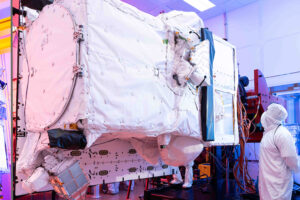The gut microbiota: an incredibly rich ecosystem

We call it the “second brain,” but what exactly is it? What do we know about it today, and what are the medical applications? Five scientists addressed these questions in the public conference “The gut microbiota: towards new health practices,” held at the Institut Pasteur in connection with Brain Awareness Week.
They are all investigating the microbiota, each in their own way. The five scientists speaking at the conference held at the Institut Pasteur on March 16, 2024, with specializations ranging from immunology to neuroscience and addiction studies, shared their fascination for the microbial ecosystem that lines the inside of the gut. The links between the gut microbiota and general health are multiple and complex – and much remains to be explored. We take a closer look at the latest research on the microbiota.
A highly sensitive micro-world
Benoît Chassaing, a Research Director in microbiology at Inserm, began by introducing the subject: “We have microbiota in and on our skin, mouth, vagina, lungs… But the gut microbiota is the largest.” It is composed of 100,000 billion microorganisms. “In one gram of fecal matter, there are as many microorganisms as there are people on Earth!”
This community of microbes is extremely complex in terms of both composition and organization: there are different groups (viruses, fungi, archaea, protists and bacteria, the largest group) and multiple interactions between them and with the environment. A rich, varied microbiota is a healthy microbiota. But factors such as diet, antibiotics, stress and contamination with pollutants can deplete the microbiota and eventually lead to an imbalance known as dysbiosis. This can give rise to disorders or diseases, including inflammatory bowel disease, diabetes, obesity, arthritis, cancer and even anxiety or depression.
Beneficial bacteria
When did we begin studying the bacteria in the microbiota? “They were originally only seen as a threat,” says Gérard Eberl, an immunologist at the Institut Pasteur, “until 1903, when the Russian scientist Ilya Mechnikov showed that they could be beneficial to us.” Research continued at the Institut Pasteur in the 1920s and progressed as technology improved. With advances in microscopes and then bacterial genome sequencing, the verdict was clear: the microbiota can provide benefits for the body.
Gérard Eberl’s team is aiming to elucidate the way in which bacteria work with the immune system, by collaborating with experts from other disciplines such as neurosurgery, “as there are strong links between the microbiota, the immune system and the brain.”
Brain and gut – inextricably linked
Gabriel Lepousez, a neurobiologist at the Institut Pasteur, works with psychiatrists and gastroenterologists. “Together, we observed that there is high comorbidity between gut disorders and mental health. So we tried to shed light on the ways in which the brain and the gut communicate…” The answer is via chemical messages (some produced by the gut microbiota) and nerve messages, given that the gut, like the brain, also has nerve cells – but not as many.
When the microbiota is impaired, this can disrupt hormone production (affecting serotonin, for example) and lead to depression. But there can also be impacts on memory, learning, eating habits, moods and emotions. The recent surge in data is opening up new avenues for diagnostics and treatment, based on bacteria.
Liver and addiction
Anne-Marie Cassard, an endocrinologist and Research Director at Inserm and Paris-Saclay, is studying the effects of the microbiota on alcohol addiction and alcoholic liver disease. She involves patients in her research, and she has demonstrated the involvement of the gut barrier: “We know that when someone has alcoholic liver disease, their microbiota is impaired.”
The liver and the microbiota are therefore closely linked – and this is useful to know as it can change our approach to patient treatment. Experimental research has shown that increasing dietary fiber can stimulate the production of certain amino acids that help strengthen the immunity of the gut barrier and the liver. Another discovery has been the impact on addiction. “People who become addicted to alcohol have an impaired microbiota even before the onset of their addiction. We therefore wanted to identify which metabolites (chemical compounds) are involved so that we can develop targeted diet- and drug-related procedures.”
Microbiota donors?
The worrying rise in chronic diseases since the 1950s is a major concern for Joël Doré, a Research Director at Inrae, AgroParisTech and Paris-Saclay. This pioneer in “microbial ecology,” who has discovered links between the gut microbiota and several diseases, points out that “the involvement of the microbiota is being increasingly demonstrated for neurodegenerative and neuropsychiatric diseases. It has been proven for some forms of autism, depression and multiple sclerosis.”
So… what if we donated healthy microbiotas to people with medical conditions? This is an option that is being given serious consideration: “The therapeutic potential of fecal microbiota transplantation is huge.” This involves taking stool samples from a healthy individual and transferring them to an individual with a medical condition. The treatment is already used, successfully, in patients with Clostridium difficile (bacteria that cause gut disorders and heavy diarrhea). In terms of diagnostics, “fecal microbiota analysis is likely to become a common procedure, like a blood test.” Before that point, official technical standards will need to be established and huge volumes of clinical data considered… Teams are already working on it.(see The French Gut Project).
the-gut-microbiota-an-incredibly-rich-ecosystem



.png?width=1200&height=630&fit=crop&enable=upscale&auto=webp)


